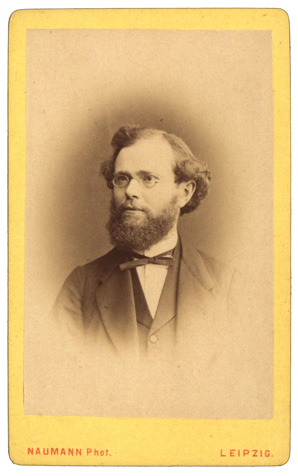Hermann Paul - A Biography
The Early Years

The son of a master mason, Hermanm Paul was born on August 7, 1846 in Salbke. It was there, in this small town just outside Magdeburg, that he spent his childhood. After attending the local primary school, Paul then continued his education in Magdeburg at the secondary school, the Klostergynmasium Unserer lieben Frauen, where he passed his secondary school exams (Abitur) in 1866.
Soon after receiving his certificate, Paul initially registered as a student of philology in Berlin but transferred to Leipzig a short time later in the summer semester of 1867, where he began to study under the tutelage of Friedrich Zarncke. Later Paul (1922) cites Romance language specialist Ebert, Slavic language specialist Leskien as well as Georg Curtius, whose lectures he had once attended, as having played an influential role on his education. Among his peers Paul found companionship in Eduard Sievers and Wilhelm Braune, with whom he enjoyed engaging in intriguing academic conversations.
In August 1870 Hermann Paul presented his dissertation entitled, Über die ursprüngliche Anordnung von Freidanks Bescheidenheit, to Friedrich Zarnke and finished his post doctoral dissertation, Zur Kritik und Erklärung von Gottfrieds Tristan, a mere two years later, qualifying him for the position of assistant/associate professor (Privatdozent).
Career at Albert-Ludwigs-Universität
In May of 1874 Hermann Paul accepted the position as (junior) professor at the University of Freiburg, where he would later come to be regarded as an extraordinary professor of German linguistics and literature. There he served as the successor of Ernst Martin, due to the unfortunate and unexpected death of Associate Professor Amelung, whom the university had originally selected for this position. In his academic début Paul addressed the subject of spoken and written language in a lecture entitled “Mundart und Schriftsprache” (Document 1). After three years had passed, he was finally given tenure as full professor.
In spite of numerous challenges encountered throughout the years spent in Freiburg, including lack of recognition and disputes over wages, Hermann Paul still managed to produce a number of important, scholarly works. His schooldays passion for Old High German literature and above all, Middle High German literature lead to the publication of a collection of Middle High German literary pieces as well as the compilation of his work on Middle High German grammar, which first appeared in Halle in 1881. Even today this particular contribution of Paul’s is regarded as one of the classic texts of medieval studies.
Achievements
The first edition of Paul’s most reputable publication, “Principles of the History of Language” was printed in 1880. In this book, he systematically called into question the previous assumptions which had been based upon the underlying principles of the Junggrammatik school of thought. His work was later described by Kilian (1997) as being the principle foundations, which had considerably influenced the “methodology and theory of the field” (ebd.: 42). The significance and value of his book is attested to merely by the countless number of editions published as well as its translation into other languages. As early as 1888 an English translation of this most famous work began, eventually appearing in 1890 as translated by Herbert Augustus Strong. A translation into French by Dr. Karsten, a former student of Paul’s, had been planned as well, but unfortunately was never completed. Some seventy years later, in 1965, a Japanese translation by Kinosuke Fukumoto was published.
Beginning with the publication of these principles, a change in Hermann Paul’s research interests became recognisable; namely a shift from a historical focus on the older varieties of German to a concentration on New High German. The results of such interest are evident in his further work such as his contributions to the Deutsche Wörterbuch (German Dictionary, 1896) and a five book series on Deutsche Grammatik (German Grammar, 1916 – 1920), which he continued to work on throughout his retirement as Emeritus Professor at the LMU in Munich.
Litterature
Auer, Peter und Robert W. Murray (Hrsg.) (2015): Hermann Paul's Principles of Language History" - Translations and Reflections. Boston/Berlin: de Gruyter.
Auer, Peter (2015): Reflections on Hermann Paul as a Usage-Based Grammarian. In: Auer/Murray (Hrsg.) 177-208.
Fertig, David (2015): Two Conceptions of Analogical Innovation/Change. In: Auer/Murray (Hrsg.) 209-236.
Henne,
Helmut; Kilian, Jörg (1998): Hermann Paul: Sprachtheorie,
Sprachgeschichte, Philologie. Reden, Abhandlungen und Biographie.
Tübingen: Niemeyer (= Reihe Germanistische Linguistik 200).
Hopper, Paul (2015) Hermann Paul's Emergent Grammar. In: Auer/Murray (Hrsg.) 237-256.
Kilian,
Jörg (1997): Der Sprachtheoretiker und -historiker. In: Burkhardt,
Armin; Henne, Helmut (Hgg.): Germanistik als Kulturwissenschaft.
Braunschweig: Ars & Scientia, 35-46.
Murray, Robert W. (2015): In the Beginning was the Sound Image: Paul's Theory of Sound Change. In: Auer/Murray 257-290.
Paul,
Hermann (1922): Mein Leben. In: Beiträge zur Geschichte der deutschen
Sprache und Literatur 46, 495-498 [Wiederabdruck in Henne/Kilian 1998,
3-6].
Wilhelm Streitberg, Hermann Paul, Indogermanisches Jahrbuch
9, 280-285.
(http://www.uni-giessen.de/gloning/at/streitberg_1924_nachruf-hermann-paul.pdf).

